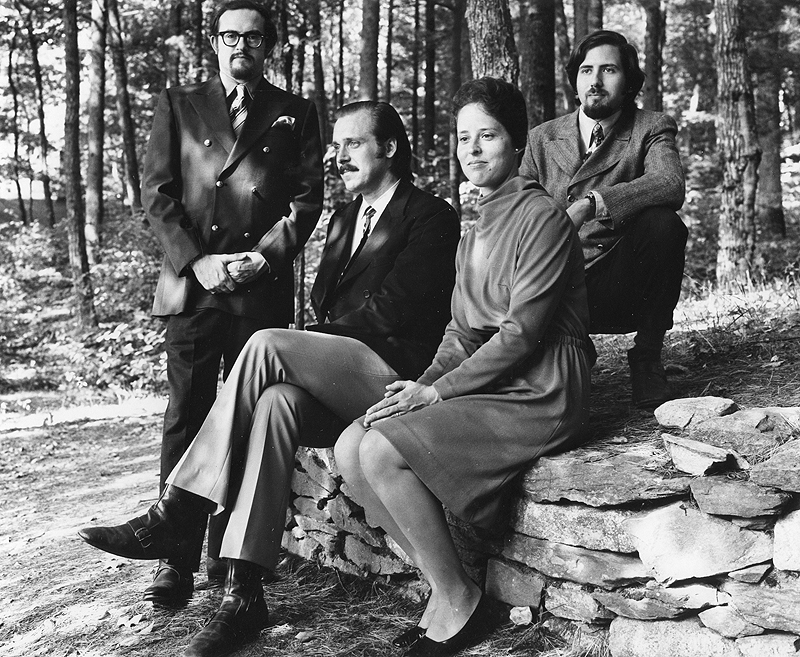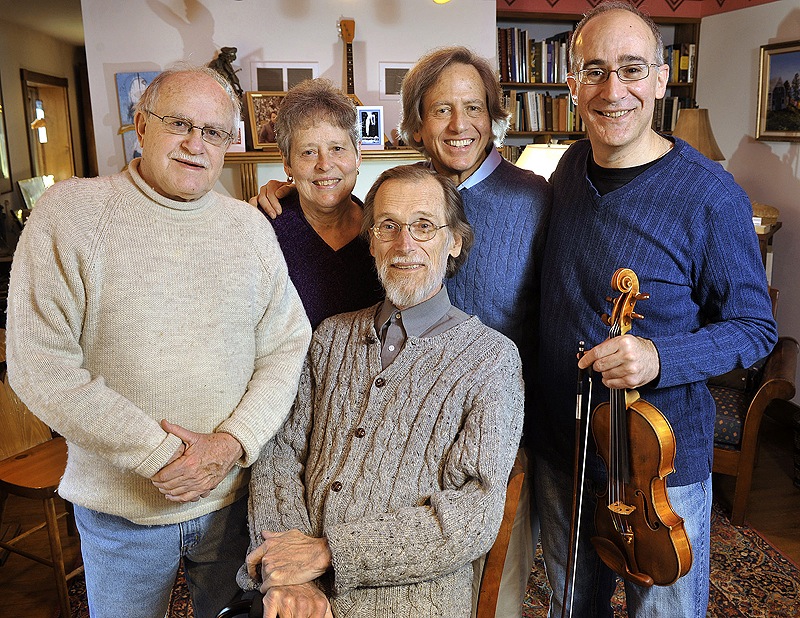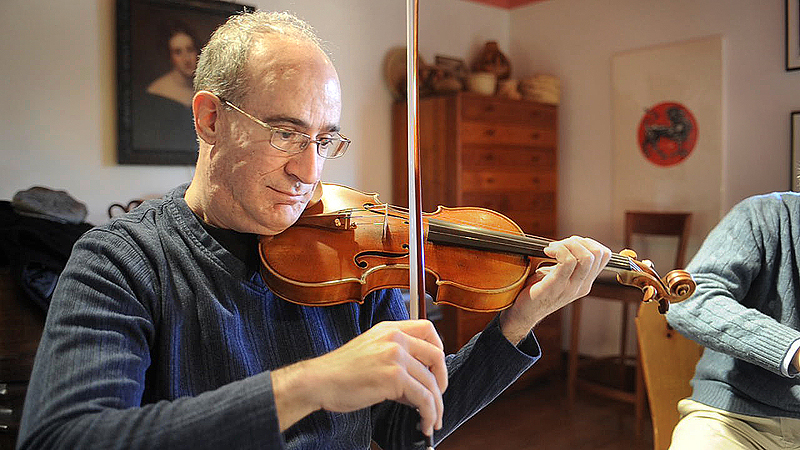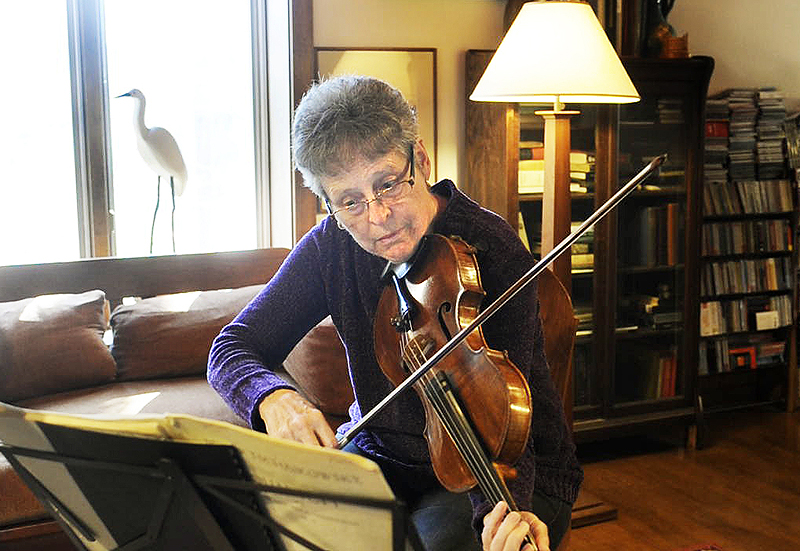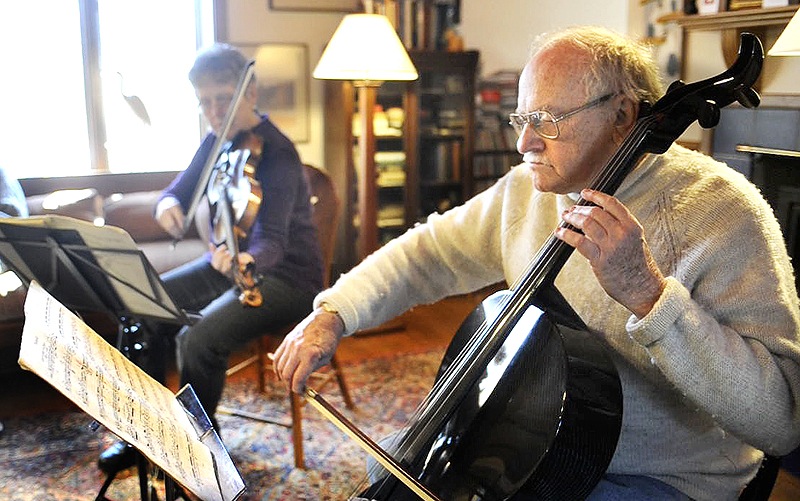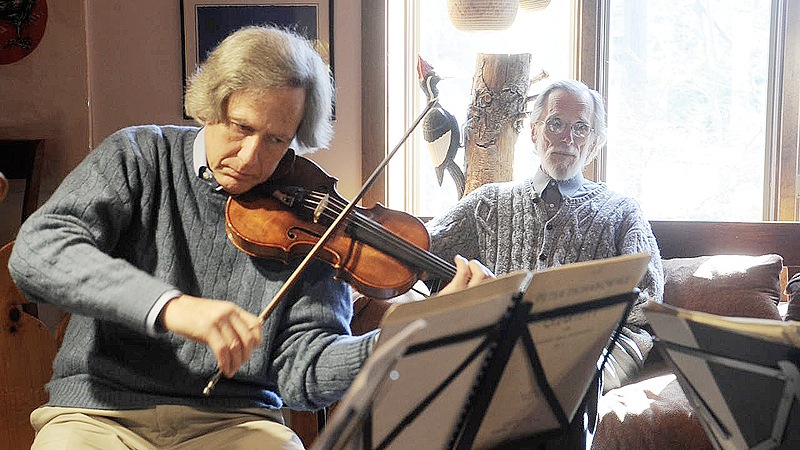His colleagues were shocked when Steve Kecskemethy delivered the news. They knew he was in pain. That was obvious at the final concert that he performed with the Portland String Quartet in late 2011.
But when the violinist told them early last year that he had been diagnosed with cancer and was no longer physically able to perform, they couldn’t believe it. Tears and hugs followed disbelief.
For the first time since the quartet formed in 1969, the group faced a member change.
And it almost caused the end of the group itself.
“I had intended to be with the quartet all my life,” Kecskemethy said recently. “My life has been the quartet. It’s been tough to leave them, but everything does come to an end.”
On Sunday, Kecskemethy and the three other founding members of the Portland String Quartet — violinist Ronald Lantz, violist Julia Adams and cellist Paul Ross — as well as Kecskemethy’s replacement, Dean Stein of Harpswell, will stand together at Woodfords Congregation Church in Portland and receive national recognition from Chamber Music America.
The classical music organization will confer its 2013 CMAcclaim Award on the quartet for its “significant impact” in the community. The award recognizes the quartet’s longevity and contributions to the cultural well-being of Portland and all of Maine.
The group is unique in part because of its longevity, but mostly because it stayed together for so long without a change in membership, said Margaret Lioi, chief executive officer of Chamber Music America.
Lioi will be in Portland on Sunday to present the award in person. Many times, honorees will travel to New York to receive the award, but given the special relationship that the Portland String Quartet has with its home city, it seemed appropriate to deliver the award in Portland, she said.
“There may be another group who can claim greater longevity without a member change, but I can’t think of one — and I have checked with my colleagues all around the country,” Lioi said by phone from New York. “I feel certain that no one else can boast that.”
MAKING BEAUTIFUL MUSIC SINCE 1969
The story of the Portland String Quartet is not dissimilar from the story told in the 2012 movie, “A Late Quartet.” In the movie, a string quartet faces a crisis when a longtime member announces his departure because of a life-changing illness.
As in the movie, Kecskemethy’s departure shook the quartet to its core. But unlike the quartet in the movie, the Portland String Quartet has weathered this crisis with its dignity intact.
The quartet began at the suggestion of Paul Vermel, who was then the conductor of the Portland Symphony Orchestra. The year was 1969, and the orchestra decided it needed more exposure across Maine.
Vermel tapped four of its principal musicians — all just kids barely out of college — to form a quartet to travel around the state to perform chamber music and spread the good word about the Portland Symphony.
But things were not going well. It was the quartet’s first rehearsal backstage at the old City Hall Auditorium, and all Vermel heard were raised voices.
“They were not fighting, but really arguing strongly about various musical aspects. They could not agree about tempo, balance or interpretation,” Vermel recalled during a recent phone interview from his home in Illinois.
“There was so much heated discussion and arguing. I left the room and said, ‘Oh my god, what are we doing? This is not going to work out.’ “
Vermel, of course, was wrong.
Forty-four years later, the Portland String Quartet is still performing, still making beautiful music and still resolving its musical disagreements the same way it did that fateful afternoon all those years ago: Through respectful discourse, trial and error, and hours and hours of rehearsal.
Vermel called Kesckemethy’s departure sad and very unfortunate, and saluted the four founding members for their loyalty both to the group and to each other.
“The fact that they have remained friends all through these years is really quite unusual. It’s like a marriage, but with four partners. It’s really wonderful,” he said.
REPLACING A BELOVED MEMBER
Kecskemethy’s last performance with the quartet was in December 2011. He was in great pain during that performance, and received his diagnosis soon after.
The quartet made arrangements to play the remainder of its concert season with heavy hearts and guest artists. This season, it performed under the series title “PSQ and Friends” to allow flexibility while it continued its search for a replacement.
For a while, it debated continuing as a trio or perhaps disbanding altogether.
“We thought about a lot of things,” Ross said. “We thought about continuing as a trio. We also wondered if this might be the end. But we still had music to make together, and Steve encouraged us to continue. This is what we know and what we do.”
It took a full year to name a replacement for Kecskemethy. But although Stein was not officially named as his replacement until this past January, he was a leading candidate from the start of the process.
He is a seasoned player as both a soloist and chamber musician, and has lived in Maine since 1996. He began performing in Maine as a teenager in the 1970s when he attended summer camps for string musicians at Orono.
He also spent six summers at the Bowdoin International Music Festival in Brunswick, and has performed with the DaPonte String Quartet.
“It’s an incredible honor,” said Stein, who was born in 1960 at the beginning of the decade when the quartet began performing. “I joined when this quartet was facing the most difficult decision a quartet can go through. To lose a beloved member is an unthinkable change.”
While all the members participate equally and govern themselves in a democratic way, Kecskemethy filled a special niche in the group. Aside from being the tallest member, he was also its gentlest.
The warmth of his personality, the quiet nature of his laugh and his easy rapport with the audience gave the quartet much of its personality. As first chair, he also filled a large musical role.
His colleagues said he was superb in that role because of his ability to project his personality through his playing.
“It was a fusion of soloist and chamber musician that overall reflected his love and even idealism of the ensemble,” Adams said.
Inevitably, the music will sound different with Stein in the first chair, Lantz said. There will be a different chemistry and different feel for both the musicians and the audience. Each musician has his own style, and it’s impossible and unreasonable to expect that Stein will take over for Kecskemethy without the quartet changing.
“We don’t have Steve, but we have something different,” Lantz said.
Added Ross, “We’re going to meld and change. You get used to playing it a certain way. It’s maybe going to be harder for the three of us to change than the other way around. We’re not expecting Dean to be just like Steve.”
Kecskemethy was involved in the discussions for selecting his replacement, and endorsed Stein. “We all talked about who it should be, and it came right out — ‘Let’s give Dean a call.’ It was a logical thing to do,” he said. “He is such a fine musician. It was absolutely the right thing to do.”
THRIVING WITH LARK SOCIETY’S HELP
While the roots of the quartet extend to Vermel and the Portland Symphony, its longevity is largely owed to the efforts of the nonprofit LARK Society for Chamber Music.
The organization was launched by fans of the quartet in 1980 to support the quartet after it split from the PSO. The LARK Society takes its name from the initials of each original member’s last name.
With the LARK Society supporting its efforts and organizing concerts and educational series around the state, the Portland String Quartet has thrived. The group has been reviewed in The New York Times and the Boston Globe, traveled extensively overseas and been the subject of a Harvard Business School documentary that used the quartet as a model for effective teamwork.
That’s why the change in membership is so hard, said Judith Halpert, secretary of the LARK Society and a longtime fan of the group. The musicians and their families have become so deeply rooted in the Portland music scene that everybody feels bound by a larger nuclear family.
Kecskemethy’s illness and departure hit home on a deeply personal level. It isn’t just a musician who had taken ill, she said. It’s as if a family member is facing a major medical crisis.
That’s also why the award from Chamber Music America is so meaningful and timely. It’s taken more than 40 years to earn it, but the wait is worth it, she added.
“They so richly deserve this,” Halpert said. “They just relate to the audience so very well when they play. And they relate to each other. It’s wonderful to watch them play. They really have a warm feeling toward the audience and each other. They smile a lot. That’s important — besides knowing all the notes.”
Although Sunday’s award ceremony doubles as a concert that is part of the PSQ season series, the quartet will mostly observe.
The concert, which begins at 2 p.m., will feature a former student, Patrick Doane of Kennebunk, and his Spelaeus String Quartet. Doane is a Juilliard School graduate who attended several PSQ summer workshops at Colby College and studied privately with Lantz for many years.
Also on Sunday, the quartet will release a new CD featuring live performances from recent years — all of which include Kecskemethy. Among his final official acts with the quartet, Kecskemethy spent many hours listening to recordings from over the years with Adams, and the CD reflects some of his choices.
Because the Portland String Quartet has been in Portland so long, it might be natural for local audiences to take it for granted, said Lioi of Chamber Music America.
The Portland classical music community, and by extension the entire state because of the quartet’s outreach efforts, are lucky a quartet of this caliber opted to stay in one place for so long, she said. Most quartets would have moved on to bigger cities and better professional opportunities.
“Those of us of a certain age have seen and continue to see the world change so rapidly. The communication is so quick and electronic. Our phones are talking to us, our cars are talking to us,” she said. “I think it’s important to stop for a moment and recognize the significance of the long-lasting relationship and long-lasting exposure to excellent music between this quartet and its community.
“That is not something that everybody has the opportunity to experience. I am very envious of the people of Portland. It’s very special and unusual.”
Staff Writer Bob Keyes can be contacted at 791-6457 or:
bkeyes@pressherald.com
Twitter: pphbkeyes
Send questions/comments to the editors.



